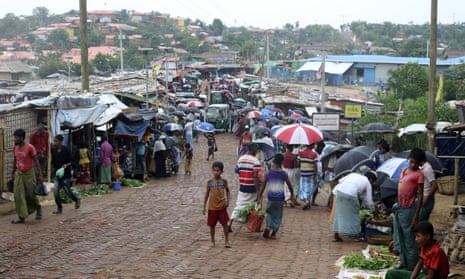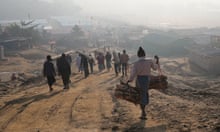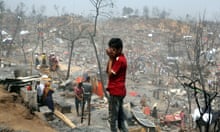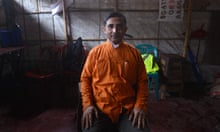Rohingya leaders have urged Bangladesh to lift an internet ban imposed on a million refugees in the city of Cox’s Bazar, warning that rumours and panic over Covid-19 is deterring people from getting tested.
Limits on communication are exacerbating already dire conditions for the Rohingya refugees from Myanmar, who live in cramped bamboo huts with as many as eight family members to a room, and are dependent on communal taps and toilets. In some areas, basics such as soap are lacking.
Aid agencies in the city in south-east Bangladesh, 20 miles from the border with Myanmar, have warned repeatedly that the virus could thrive in the camps and that medical facilities would be unable to cope. As of 10 June, 35 refugees have tested positive for Covid-19, according to the World Health Organization, while three have died. In total, 30 are in quarantine, though it is feared that there are more undetected cases.
The outbreak has coincided with flu season, adding to confusion over symptoms, but community members say that people are avoiding going to clinics because they are worried about being moved to isolation facilities.
Last week, two people fled quarantine because they believed they would be sent to centres far from their families, according to reports.
Many of the Rohingya refugees sheltering in Cox’s Bazar fled to Bangladesh in 2017, following a military crackdown in Myanmar on its minority Muslim population, which the UN has since said was carried out with “genocidal intent”. After three years in the camps, with people unable to access education or build livelihoods, conditions have become increasingly desperate. Since the start of the year, many have attempted to flee Cox’s Bazar by embarking on dangerous boat journeys to Malaysia, 1,000 miles away. They have then been left stranded at sea for months as countries respond to the coronavirus pandemic by tightening their borders.
This week, 270 refugees were detained by Malaysia after their damaged trawler was intercepted by the country’s coastguard.
Separately, another boat carrying hundreds of refugees from Cox’s Bazar was recently intercepted by Bangladesh and escorted to Bhasan Char, a remote silt island, apparently to reduce the risk of bringing the virus into Cox’s Bazar. Some refugees fear they could face the same fate, though the UN’s refugee agency said that 200 beds in severe respiratory infection isolation and treatment centres were available, and that hundreds more were being established.
Mohammad Shaiful, 25, who lives with his wife, uncle and one-year-old daughter, said misinformation spread quickly in the camp. “There’s a rumour that people will be killed in quarantine,” he explained. “Like doctors are injecting them with something that’s causing the deaths. Also, doctors are ‘giving’ coronavirus to people who don’t even have it and killing them. People tend to believe those rumours rather than putting some sense into it.”
Refugees are being urged to maintain good hygiene and physical distancing but at the same time aid work has been cut to reduce the risk of transmission. Though essential services such as food and sanitation are continuing, one community leader said that in his area toilets had become unusable because they were not being maintained.
“Honestly, we are not practising hand washing and maintaining sanitation because the particular NGOs who are responsible for hand washing and hygiene and sanitation, they are not coming in the camp,” said Mohammad Jaffa, a community leader in camp 7 of Cox’s Bazar.
Tun Khin, president of the Burmese Rohingya Organisation UK, said that the Rohingya were grateful to Bangladesh for hosting them in Cox’s Bazar, but that internet services should be switched on so that people could receive news and reliable information about the pandemic.
“They can’t follow what’s happening in the world and how many people have died. They need to know what is happening with Covid-19 so they can learn from that and see how it is a danger to the whole community,” he said.
The Bangladeshi government has repeatedly stated that it is doing far more than other countries to support the Rohingya, and says that the internet ban has been imposed for security reasons.
Markets and shops were closed, said Abu Tahir, 37, who lives with his wife and three children, but people could not stay isolated inside tiny rooms all day.
“I don’t know what will happen if I test positive for Covid. “I’m not so sure about this quarantine thing. If anything’s to happen to me, I’d like to have my children and loved ones around me. And they say there’s no treatment for this disease, then what’s the point of isolating?
“We’ve already been through a lot. But we survived because the Almighty has a soft corner for us. He’ll take care of us.”










